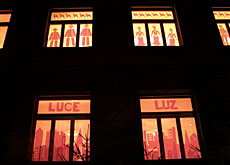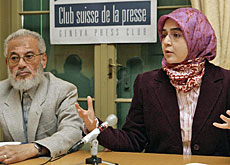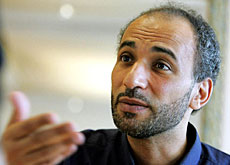Christmas trees to remain in the classroom

A debate has been raging in Switzerland for several days about whether Christmas celebrations hurt Muslims' feelings and should be banned at school.
Muslims themselves recently gave their support for maintaining Christmas traditions in Swiss classrooms.
The whole debate seems to have been triggered by misconstrued comments by the president of the Swiss teachers’ association that no one in Switzerland should be forced to take part in religious celebrations.
Earlier this month an article published in the tabloid newspaper Blick, quoted Beat Zemp, president of the association, as saying: “Advent calendars and Christmas trees have no place in the classroom”.
This led to questions whether, in view of Switzerland’s multi-religious society, traditional Christmas should actually be banned at school.
Central to the debate was the Swiss Muslim community, who critics accused of exerting pressure on the school authorities.
But as Zemp explained to swissinfo, the newspaper misquoted him. “What I did say was that no one should be forced take part in religious celebrations or religious education. That’s also what it says in the constitution.”
He also claims he said that if religious acts were carried out in class or during celebrations, or if songs were sung with a Christian connotation, the parents of other religions could request permission to be exempted.
Dispensation
The Swiss press were quick to act and dug up a case in canton Vaud where a Muslim family had asked for dispensation for their children for the whole of December.
No media outlet could seem to resist getting involved in the debate, with most Swiss newspapers assuming the mantle of defenders of Christmas at school, led by the Neue Luzerner Zeitung and its headline: “The Christmas tree remains in the classroom”.
Under pressure, the Swiss Muslim community was forced to react.
Earlier this week a group of Swiss-based Islamic organisations made a joint appeal not to ban Christian and in particular Christmas traditions from the classrooms. To do so would be inappropriate and would not contribute to religious peace, they said.
Children should not be forced to perform religious acts or take vows, even in the form of songs or poems, the organisations said. But as part of compulsory schooling, each child should take part in religious celebrations and activities, they wrote.
Appeal
They appealed to people to avoid extreme demands or behaviour, and resist agitators “who try to foment trouble between Christian and Muslim communities”.
“It’s a real shame that this discussion started at all,” Ismail Amin, president of the association of Islamic organisations in Zurich (VIOZ), told swissinfo.
According to Amin, the media “made a mountain out of a molehill” exaggerating the whole thing. The media are on the look out for sensational stories, he added, and “this story about Christmas time lent itself well”.
Of course, this was not just an isolated case. “For years the presence of Muslims in the media has been dominated by negative images,” said Amin, who feels that religion has become politicised.
In Switzerland, and in Europe in general, popular rightwing circles take great delight in stories such as the Christmas-at-school debate, said Amin.
“I’ve seen for myself that Islam is being portrayed in a bad light,” said the Egyptian-born former professor of Arab philology from Zurich University.
swissinfo, Urs Maurer
There are about 340,000 Muslims in Switzerland, coming mainly from the Balkans and Turkey.
They represented 2.2% of the population in 1990 and 4.3% in 2000.
One of the main reasons for the rise is the arrival of refugees from the former Yugoslavia.
There are currently two mosques in Switzerland – one in Zurich and another in Geneva.
The People’s Party launched an initiative in the Zurich cantonal parliament in August to ban the construction of minarets in the canton.
In Switzerland Christmas Day is a national holiday and in parts of the country December 26 is also a public holiday.
The precise origin of assigning December 25 as the birth date of Jesus is unclear. It was first identified as the date of Jesus’ birth by Sextus Julius Africanus in 221 and later became the universally accepted date.
The Romans held a festival on December 25 called Dies Natalis Solis Invicti, “the birthday of the unconquered sun.”
The earlier term Yule may have derived from the Germanic jol or the Anglo-Saxon geol, which referred to the feast of the winter solstice.

In compliance with the JTI standards
More: SWI swissinfo.ch certified by the Journalism Trust Initiative











You can find an overview of ongoing debates with our journalists here . Please join us!
If you want to start a conversation about a topic raised in this article or want to report factual errors, email us at english@swissinfo.ch.